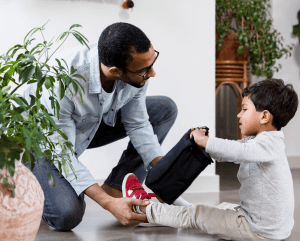High profile acts of violence, especially school shootings, can be frightening and confusing to children. Even well-intentioned safety measures like ‘active shooter drills’ at schools can also amplify intense worries in children who fear their friends or loved ones’ safety.
Step 1: Reassure your child that they are safe. Emphasize that schools are very safe.
Remind them that school shootings are rare. It is important for them to know this even if you are feeling unsure. Validate your child by reassuring them that all feelings are okay and that it makes sense if they are worried about school safety.
Step 2: Ask your child what they know about the event.
Children are highly perceptive and may learn about high profile acts of violence like school shootings through social media, the TV, their peers, or by overhearing adult conversations. They may know about the event before you get the chance to talk to them about it. A child’s perception of what happened may be very different from reality. Check in with your child and see what their understanding is and help clarify facts if they are confused or misinformed.
Step 3: Encourage questions, now and in the future.
Reassure your child that it’s okay to talk about sad and scary events like school shootings. Establish an open dialogue with your child by reminding them that no question is too scary to talk about. It’s also okay to let your child know that these events are sad and scary to you too. If we don’t let a child know that adults can also feel sad and scared, the child might feel there is something wrong with them for having those emotions. Letting your child know that you share their feelings, helps to normalize their reactions and allows for a moment of connection and care.
Step 4: Provide age appropriate explanations.
Children of varying ages have different developmental levels of understanding and thinking. Adjust your response accordingly. Let the questions that they ask be your guide as to how much information to share. The National Association of School Psychologists recommends thinking of your child based on these age groupings:
Pre-K-Early Elementary School:
Children this young are not able to understand abstract concepts. These children need brief, simple information that is coupled with reassurance. Remind the child that adults are there to protect them, and give concrete examples of school safety methods like locked doors, the name of the school security guard, and how they practice safety drills as a class.
Upper Elementary – Early Middle School:
These children are likely to hear quite a bit about high profile events from their peers. Children at this age also have highly vivid imaginations. They may need help understanding the difference between a worry and reality. Sit with these children and remind them of all the steps their school, parents, and community are taking to keep schools safe. Make sure your child understands that the adults in their life are taking steps to keep them safe.
Upper Middle School – High School:
Tweens and adolescents are more able to conceptualize abstract ideas and may have their own opinions about the causes and solutions for violence in schools and society. Ask them what they think and be open to their opinions, even if it differs from yours. Help them regain a sense of control by reminding them of their own role in maintaining school safety, such as reporting a sighting of a stranger, or not holding doors open for someone you don’t know. Remind them that reporting a threat they see on social media is not “tattling” or “snitching”. Make sure they know that the adults and community are doing everything they can to help, and that they can participate in the culture of safety too.
Step 5: Review safety procedures for school shootings.
Talk to your child about what steps they should expect adults and kids to take during unsafe situations. Help your child identify at least one adult at school and the community that they can go to if they feel frightened. Tell them what steps you will take to keep them safe. Make sure they know your full name and phone number. If they are too young to remember it, write it down for them and make sure they know where to find that information in their bag.
Step 6: Be patient.
Children do not always want to talk about their feelings right away. Look for clues that they want to talk. Are they hovering around while you do housework? Are they drawing pictures of the event or writing stories? Imaginative outlets may indicate that your child is trying to make sense of these events and you can approach them about their projects.
Step 7: Monitor your child’s emotional state.
Lots of kids will show their emotional state through behaviors. This could include a sudden change in their appetite or becoming very picky with foods. Kids may also have nightmares, sleep restlessly, wake up unusually early, resist bedtime, insist on sleeping in your bed or with all the lights on. Some kids will withdraw and become quiet, others may be explosive and moody. Some kids will complain of physical discomfort like an upset stomach, a headache, or frequently go to the school nurse asking to get sent home. All of these behaviors can indicate a child is struggling with big emotions. For many kids, these behaviors may dissipate with reassurance and time. If these symptoms do not dissipate, or if your child has had past exposures to traumatic events, then it is a good idea to seek the help of a mental health professional.
Step 8: Limit access to social media and TV viewing.
The news cycle can be overwhelming and images that pop up on TV are hard to predict or control. News channels are designed for adult viewers, and the information and images they convey can be frightening and confusing to young children. Teenagers may benefit from a break from social media following a school shooting, as they may read hateful comments on posts that can be hard to process at a vulnerable time.
Step 9: Keep your routine.
During stressful times, many people are likely to abandon their routines. However, routines and daily structure help kids feel grounded. Do your best to maintain your regular routine. Continue to send them to school. Make sure they still eat meals at regular times and attend their activities. Encourage them to do their homework. Give them opportunities to play outside and promote physical health. Reassure them that the world is not ending, and their lives remain predictable and safe.
Additional Tips:
Focus on the helpers:
Remind children that most people are good. It is true that sometimes a person will do bad things. But most people will do good things. Encourage your child to see acts of goodness even in the aftermath of a tragedy. Point out all the people who have stepped up to help in the frightening event and in afterwards. This conversation will allow your child to voice their fears and give you the chance to reframe them so they also have reason to hope.
Empower your child:
Ask your child if they have ideas on how to help. This could include fundraising, pen pals, or a donation. Show your child what you are doing to help, for example let them sit with you when you call your elected official.
Hug your kid:
Physical comfort can go a long way. If you can’t find the words, just give your kid a hug.
Use resources to help structure conversations about school shootings:
School shootings and violence is hard to talk about. Many families find it’s easier to structure the conversation around a resource like a book. Here are some great books that address violence for kids at different ages.
Pre-K- Age 6:
- I’m Not Scared, I’m Prepared by J. Cook – This book walks a child through what to expect during a school shooter drill at school and aims to relieve anticipatory anxiety by empowering young children with concrete examples of what they can do and adults can do to stay safe.
- Come With Me by H. McGhee – This story is about a child who sees scary stories on the news and wonders how to make the world a better place. It encourages children to focus on the helpers and empowers them to take small steps towards being a helper too.
- A Terrible Thing Happened by M. Holmes – This picture book is written to help children overcome traumatic experiences. It follows a child who’s feelings and behaviors have been ‘off’ ever since the terrible thing happened and their journey of healing.
Tweens
- A Kids Book About School Shootings by C. Miller – This book is written in the first person by a survivor of a school shooting. The story validates all the emotions that happen during a trauma, the struggle to process the trauma afterwards, as well as a heavy focus on healing and hope. This beautifully written book has graphic lettering for visual interest instead of illustrations that might be triggering.
High Schoolers
- #NeverAgain: A New Generation Draws the Line by D. Hogg & L. Hogg – This novel is written by two survivors of the Parkland school shooting for adolescent readers. It explores their experience with trauma and the steps they have taken to bring about lasting change. This book encourages young readers to step into their own power and join a movement against school violence.
Learn More About Parent Coaching in Scotch Plains, NJ and Branchburg, NJ
When your child is hurting, so are you. In addition, it can be difficult to support your child when you are struggling with the news yourself. With the guidance of an experienced parenting therapist, you can receive useful insights and tools to equip you for the parenting journey. You can expect a safe, non-judgmental space when you visit our Scotch Plains, NJ-based practice. Or, learn about our online therapy services for the residents of New Jersey. To start your therapy journey, please follow these simple steps:
- Contact Brave Minds Psychological Services
- Meet with a caring therapist
- Get the parenting support you deserve
Other Services Offered at Brave Minds Psychological Services
At Brave Minds Psychological Services, we believe child therapy can make a massive impact. That said, we also offer other mental health services outside of parents therapy.
Our therapists offer parent counseling. Along with more general counseling for children, we specialize in anxiety treatment for children and child sexual abuse therapy. Additionally, we have therapists who specialize in offering therapy for teens, including counseling for teens with anxiety and social phobia treatment for teens.
Additionally, we offer a wide range of mental health services for adults including anxiety treatment, couples therapy/marriage counseling, counseling for postpartum depression, OCD treatment, bereavement counseling, and food allergy therapy. Finally, we have specialized trauma therapy and PTSD treatment. This includes counseling for birth trauma, pregnancy loss and miscarriage, equestrian trauma, and sexual assault counseling for adults,
We also have a blog where we write about a variety of different mental health subjects. If you’re interested in learning more about our services here at Brave Minds Psychological Services or online, please contact our Scotch Plains counseling office!





